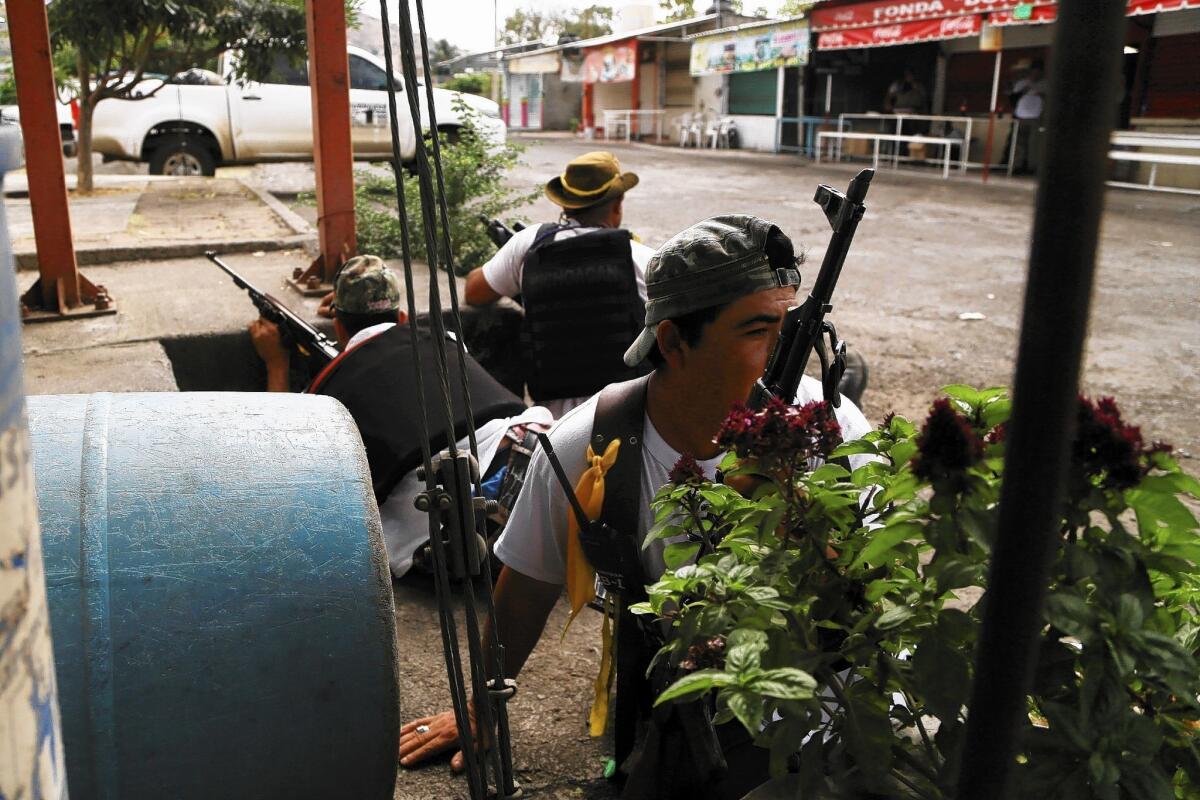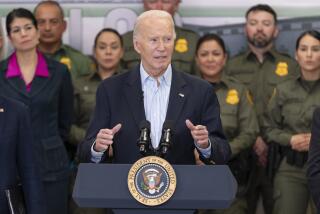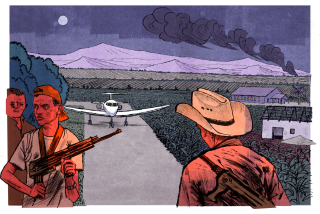Mexico tells vigilantes to abandon fight against cartel in Michoacan

MEXICO CITY — Federal authorities rushed Monday to head off a mini-civil war in the “hot land” of Mexico’s Michoacan state, urging rural vigilantes to lay down their arms and go home rather than attempt to seize a city of 90,000 that has become a stronghold of a drug cartel calling itself the Knights Templar.
The armed peasant groups emerged last year to fight off the cartel, which had metastasized throughout the southwestern state, coordinating the lucrative methamphetamine trade and extortion rackets and wielding significant control over the major container port of Lazaro Cardenas. Until recently, the self-defense groups had been largely tolerated, if not encouraged, by President Enrique Peña Nieto’s administration, which had allowed them to staff some roadblocks alongside federal police and soldiers.
But in the last week, the groups have taken control of a number of communities surrounding the city of Apatzingan. Their leaders declared that their goal was to drive the cartel out of the city for good.
Facing a possible bloodbath, Interior Minister Miguel Angel Osorio Chong convened Peña Nieto’s security Cabinet on Monday afternoon in Morelia, Michoacan’s capital. He announced that the federal government would assume control of security matters in Tierra Caliente, or Hot Land, the fertile agricultural region that has become a deadly battleground. From now on, he said, illegality will be dealt with in a “severe and inflexible manner.”
Hundreds of troops and federal police officers have been deployed to the region, but in some cases they have been reluctant to get too involved in the escalating conflict: When armed vigilantes over the weekend rolled into the town of Nueva Italia, less than 20 miles east of Apatzingan, soldiers stationed there reportedly did little more than look on.
Osorio Chong exhorted the self-defense groups to return home and said there would be “no tolerance” for anyone carrying unauthorized weapons. He suggested that vigilantes, rather than take up arms illegally, should join official police forces — or report suspected wrongdoing via a toll-free tip line.
In a radio interview minutes later, self-defense group leader Hipolito Mora vowed to “continue in our struggle,” and said the groups had no intention of disarming. “It’s easy to say [we should disarm], because they’ve never lived through the hell that we’ve lived through,” Mora said, referring to what he said were years of cartel harassment.
“It’s really sad that [the government is] against us,” Mora said. “From my point of view, I’d want to be against the Knights Templar first. And after finishing with them, after finishing off that organization, the government wouldn’t need to run after us.”
Like many struggles in contemporary Mexico, the turmoil in Michoacan does not lend itself to a simple narrative of good guys versus bad guys. There is widespread suspicion that at least some of the vigilantes are fronts for rival drug cartels who may be engaging in a turf battle by proxy. And the Knights Templar, firebrand evangelical Christians who portray themselves as the saviors of their state, have a dedicated following in Michoacan, particularly in Apatzingan. Masked groups of apparent Knights Templar followers have been setting fire to buildings and cars in the city in recent days to protest the vigilante presence nearby.
Michoacan Gov. Fausto Vallejo announced Monday that his government would relocate to Apatzingan, apparently in a show of resolve and support for the people there. Residents, meanwhile, said the city remained eerily quiet Monday as everyone, including troops and federal police, waited to see whether the vigilantes would arrive.
“The schools are closed, there’s no activity,” said carpenter Ezequiel Garcia, 67. “There’s a lot of fear. I wanted to work today, but one of my sons called me and said not to go out.”
Garcia said he listened to Osorio Chong’s promise to restore order, but doubted the minister could do much to improve things. “The federal police are here, and they don’t do anything.... And yes, the troops come, but after the [protesters] set fire to the cars.”
Although the near-anarchy that has engulfed Michoacan does not threaten the stability of the country as a whole, it presents a daunting counter-narrative to the story that Peña Nieto would like to tell about Mexico. The president, who took office in December 2012, has pushed through ambitious economic and political reforms that he says will result in a more stable, transparent and affluent country.
For now, Michoacan is merely one of numerous swaths of Mexico that remain terrorized, and in some cases controlled, by drug cartels. The latest U.S. State Department travel warning for Mexico, issued last week, noted significant criminal activity in 19 of the country’s 31 states, much of it committed by organized crime groups. The violence in Mexico has continued even though Peña Nieto’s predecessor, Felipe Calderon, spent most of his six-year term confronting the drug gangs with a militarized approach. During that time, tens of thousands of people died in the country from drug-related violence.
Even as the current administration has distanced itself from Calderon’s strategy, it has struggled to find new solutions to the cartel scourge.
Peña Nieto inherited much of the Michoacan problem from Calderon, whose deployment of troops failed to pacify the state. In November, the administration sent troops and police to Lazaro Cardenas to retake the city and deny the Knights Templar a major source of revenue from its business dealings at the port. Osorio Chong said Monday that the government had succeeded in that goal.
But security analyst Alejandro Hope of the Mexican Competitiveness Institute said the administration’s decision to treat the vigilantes as a “useful tool” against the cartels appears to have backfired, emboldening the self-defense groups to go on the offensive.
“They decided they were the ones who were going to set the terms of cooperation with the government, and the government had to follow,” Hope said. “Now that has led to a very, very dangerous situation. If and when they decide to move into Apatzingan, it could be a pretty bloody situation.”
Cecilia Sanchez of The Times’ Mexico City bureau contributed to this report.
More to Read
Start your day right
Sign up for Essential California for news, features and recommendations from the L.A. Times and beyond in your inbox six days a week.
You may occasionally receive promotional content from the Los Angeles Times.






